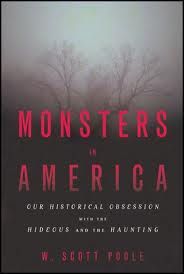If that explanation for why we have books like Pride and Prejudice and Zombies makes sense to you, or you think that the Twilight phenomenon is “ideologically and aesthetically repugnant,” then Poole’s new book, Monsters in America: Our Historical Obsession with the Hideous and the Haunting, is one you’ll want to pick up. Poole, an associate professor of history at the College of Charleston, proposes that one way to consider American history is through our horror stories – stories that come from folk beliefs, religious doctrine, and pop culture. By connecting those narratives to the major topics of American history, Poole suggests that monsters in America are both subversive and controlling, terrifying and fascinating. Unlike many other books about monsters, Poole doesn’t try to use psychology to explain why Dracula terrifies us. Instead, he explores how the idea of the monstrous can be used as a particular lens to explore history – white fears of “monstrous” Africans are reflected in a fascination with Mary Shelley’s Frankenstein, post-World War II “creature features” showed humanity’s helplessness in the face of atomic threats, and our current love (or hate) for zombies can be tied to modern obsessions with threats to our bodies. The best thing about reading Monsters in America is that the book is just plain fun. Poole writes with a clear love of the monsters he is analyzing, and that boyish fascination comes through in every chapter. Poole mentions more than 60 different movies, as many books, and countless historical moments to tie pop culture, sociology, and history together – there’s no way to read this book and not have at least a few cocktail hour tidbits to share. Admittedly, there are a few academic moments in writing (the book is published by a university press, after all). I mean, Poole uses the word “pedagogy” in the preface, which is a word no one but academics ever use in polite conversation. But for the most part Poole keeps the academic jargon to a minimum, throwing only occasional scholarly citations for colleagues to “munch on like zombies with a nice meaty thighbone.” For the non-academics in the room, I think it’s fair to say that Monsters in America is a “creepy little survey” of what monsters are and why they scare us. Monsters in America is a book about the stories we tell ourselves, but also how “the line between ‘story and ‘history’ is highly permeable” — just the way we like it.
